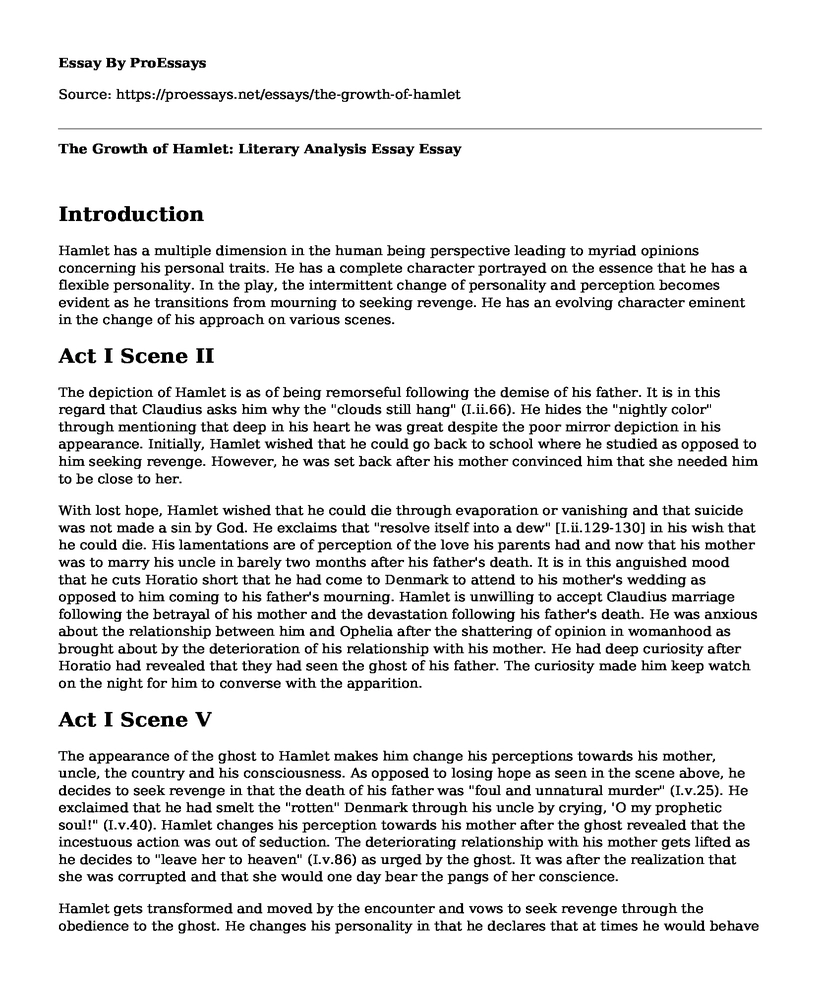Introduction
Hamlet has a multiple dimension in the human being perspective leading to myriad opinions concerning his personal traits. He has a complete character portrayed on the essence that he has a flexible personality. In the play, the intermittent change of personality and perception becomes evident as he transitions from mourning to seeking revenge. He has an evolving character eminent in the change of his approach on various scenes.
Act I Scene II
The depiction of Hamlet is as of being remorseful following the demise of his father. It is in this regard that Claudius asks him why the "clouds still hang" (I.ii.66). He hides the "nightly color" through mentioning that deep in his heart he was great despite the poor mirror depiction in his appearance. Initially, Hamlet wished that he could go back to school where he studied as opposed to him seeking revenge. However, he was set back after his mother convinced him that she needed him to be close to her.
With lost hope, Hamlet wished that he could die through evaporation or vanishing and that suicide was not made a sin by God. He exclaims that "resolve itself into a dew" [I.ii.129-130] in his wish that he could die. His lamentations are of perception of the love his parents had and now that his mother was to marry his uncle in barely two months after his father's death. It is in this anguished mood that he cuts Horatio short that he had come to Denmark to attend to his mother's wedding as opposed to him coming to his father's mourning. Hamlet is unwilling to accept Claudius marriage following the betrayal of his mother and the devastation following his father's death. He was anxious about the relationship between him and Ophelia after the shattering of opinion in womanhood as brought about by the deterioration of his relationship with his mother. He had deep curiosity after Horatio had revealed that they had seen the ghost of his father. The curiosity made him keep watch on the night for him to converse with the apparition.
Act I Scene V
The appearance of the ghost to Hamlet makes him change his perceptions towards his mother, uncle, the country and his consciousness. As opposed to losing hope as seen in the scene above, he decides to seek revenge in that the death of his father was "foul and unnatural murder" (I.v.25). He exclaimed that he had smelt the "rotten" Denmark through his uncle by crying, 'O my prophetic soul!" (I.v.40). Hamlet changes his perception towards his mother after the ghost revealed that the incestuous action was out of seduction. The deteriorating relationship with his mother gets lifted as he decides to "leave her to heaven" (I.v.86) as urged by the ghost. It was after the realization that she was corrupted and that she would one day bear the pangs of her conscience.
Hamlet gets transformed and moved by the encounter and vows to seek revenge through the obedience to the ghost. He changes his personality in that he declares that at times he would behave like a madman in the bid to hide his motives. A responsibility gets bestowed on him and he suddenly becomes a man to set things up as he exclaimed "born to set it right" (I.v.180-190). The change was a development from what we noted in the scene above that his uncle referred him to be unmanly after his continued lamentations. He changes his moral questionings and thoughts towards the engagement in a bloody act of revenge. He diverts his attention from the mourning to whether he could trust his perceptions as well as the authenticity of the claims of the ghost. His obsession makes him feign madness and he develops nervousness to handle the inquisitive questions of Horatio and Marcellus.
Act II Scene II
In the urge to fulfill his quest, Hamlet entered into a melancholy state with the perception of everyone and everything being worthless and sterile apart from Ophelia with whom he sent love letters. The disregarding perception that he had against women had already been uplifted. However, he developed an erratic behavior such that Claudius and Gertrude sought the assistance of his friends by the name Rosencrantz and Guildenstern in cheering him. His description is as "too much changed" (II.ii.36) which his pals get into its investigation. Bound with his quest, Hamlet spends most of his time alone reading or being pensive in the lobby of the castle. Despite the feigned madness, Hamlet expressed statements that were "pregnant" in his conversations (II.ii.206). The mourning mood of Hamlet breeds to unhappiness and madness that deceive his uncle-father and aunt-mother.
Conclusion
The change of Hamlet's personality across the scene is to aid him in his quest for revenge as urged by his father's ghost. After the encounter with the ghost, the change of plot becomes evident whereby he has a different perception as regards Denmark, his mother, his uncle as well as himself. He had a quest and purpose of life marked as to avenge which renders him to be unhappy and thereby feigning madness.
Work Cited
William S. Hamlet: The Pelican Shakespeare. Revised.11.1.2001.
Cite this page
The Growth of Hamlet: Literary Analysis Essay. (2022, Feb 12). Retrieved from https://proessays.net/essays/the-growth-of-hamlet
If you are the original author of this essay and no longer wish to have it published on the ProEssays website, please click below to request its removal:
- "The Tyger" and "The Lamb" Poems Essay
- Don Quixote by Miguel De Cervantes Essay Example
- Paper Example on Feminism in The Scarlet Letter by Nathaniel Hawthorne
- Divine Intervention: Athena's Protection of Odysseus in Homer's Odyssey - Essay Sample
- Essay Example on Poetry: Expression of Hidden Meanings Beyond Love
- Literary Analysis Essay on Lord of the Flies
- Essay Example on Huck's Ordinary Life: Fear, Fight & Flight







